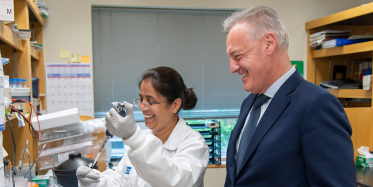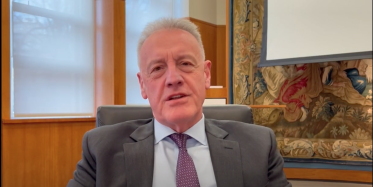Dario C. Altieri, M.D.
-
President and Chief Executive Officer
-
Director, Ellen and Ronald Caplan Cancer Center
-
Robert and Penny Fox Distinguished Professor, Genome Regulation and Cell Signaling Program
Altieri is interested in how mechanisms of cellular adaptation or “plasticity” are universally exploited in cancer for disease maintenance and progression. Multiple cellular pathways of response to stress, metabolic rewiring, and control of cell death are invariably subverted in human tumors, and often confer more aggressive disease traits including the ability to disseminate to distant organs, or metastasis. A detailed, molecular, cellular, and genetic understanding of tumor plasticity could uncover new therapeutic targets and identify novel approaches to interfere with metastatic competence, which remains the primary cause of death for cancer patients.
Born in Milan, Italy, and educated at the University of Milan School of Medicine, Altieri is a physician-scientist trained in internal medicine and holds a postgraduate degree in clinical and experimental hematology. In 1987, he joined the Scripps Clinic and Research Foundation in La Jolla, California, first as a research fellow and later as a member of the faculty.
In 1994, Altieri became an associate professor at the Boyer Center for Molecular Medicine at Yale University School of Medicine, where he was named professor with tenure in 1999 and member of the Yale Cancer Center executive committee. In 2002, Altieri was recruited as the founding chair of the Department of Cancer Biology at the University of Massachusetts Medical School and Director of the UMass Memorial Cancer Center. Altieri joined the Institute as the Wistar Cancer Center Director and its first Chief Scientific Officer in September 2010. He was appointed as President and Chief Executive Officer of Wistar in 2015 while continuing to serve as Director of the recently renamed National Cancer Institute (NCI)-designated Ellen and Ronald Caplan Cancer Center.
The Altieri Laboratory

The Altieri Laboratory
The Altieri laboratory currently studies the role of mitochondria in cancer. The lab pursues the overarching hypothesis that multiple mitochondrial functions in bioenergetics, buffering of reactive oxidative species (ROS), inter-organelle communication with the endoplasmic reticulum (ER), and retrograde gene expression are invariably reprogrammed in malignancy and exploited to enable extraordinary plasticity and tumor heterogeneity for disease progression. Mechanistically, Altieri and his team have implicated these pathways in supporting tumor cell proliferation, evasion from multiple forms of cell death and, importantly, heightened tumor cell motility and invasion, leading to metastatic disease. To understand the role of tumor plasticity and mitochondrial reprogramming in disease progression and dissemination, Altieri uses a multidisciplinary collection of biochemical, cellular, and molecular approaches in vitro, xenograft, and genetic animal models of localized and metastatic disease, in vivo, and analysis of clinically-annotated primary patient samples. Although mechanistic in nature, Altieri lab research goals have clear translational and disease-relevant implications. Altieri’s work has demonstrated that therapeutic targeting of mitochondrial reprogramming in cancer is feasible, and may uniquely disable multiple mechanisms of disease progression, including metastatic competence across a broad spectrum of genetically heterogeneous tumors. Accordingly, a first-in-class, mitochondria-targeted small molecule inhibitor of the molecular chaperone Heat Shock Protein-90 (Hsp90) was developed and characterized by the Altieri laboratory (Gamitrinib) and has recently entered first-in-human clinical trial in patients with advanced cancer (ClinicalTrials.gov NCT04827810).
-
Research Assistant Professors
Michela Perego, Ph.D.
-
Postdoctoral Fellows
Minjeong Yeon, Ph.D.
Research
Multifunctional Survivin Signaling in Cancer
The Altieri laboratory is credited with the discovery and characterization of the survivin gene. With over 10,500 citations currently in PubMed, survivin is recognized as a fundamental cancer gene, a pleiotropic molecular hub for multiple pathways of cell survival, mitosis, adaptation to stress and metabolic reprogramming, as well as a validated therapeutic target in the clinic. Altieri’s contributions in this field have run the gamut from the discovery of survivin to the characterization of its unique role at the interface between cell death and mitosis in cancer, to clinical validation as a therapeutic target and predictive/prognostic disease biomarker.
Mitochondrial Proteostasis in Tumor Adaptation
Over the past decade, the Altieri lab’s work uncovered a novel role of protein folding quality control in mitochondria as a key driver of tumor progression. These studies elucidated mechanisms of protein homeostasis, or proteostasis maintained by Heat Shock Protein-90 (Hsp90) chaperones as well as AAA+ proteases in mitochondria, characterized their role in adaptive regulation of apoptosis, metabolic reprogramming and retrograde gene expression, and identified novel mechanisms of tumor adaptation to microenvironment stress stimuli, including hypoxia or exposure to molecular therapy.
Mitochondria and Metastasis
How tumors that switch to an inefficient glycolytic metabolism, i.e. the Warburg effect, manage to accomplish highly energy-demanding tasks of cell motility and invasion has long remained elusive. Altieri’s work demonstrated that mitochondrial oxidative phosphorylation is required to fuel membrane dynamics of cell motility, resulting in increased tumor chemotaxis, invasion and metastasis. Mechanistically, Altieri showed that this pathway involves the redistribution of energetically active mitochondria to the peripheral cytoskeleton of tumor cells, where they provide a concentrated, spatiotemporal energy source to power membrane lamellipodia dynamics, turnover of focal adhesion complexes, and sustained phosphorylation of cell motility kinases.
Mitochondrial Control of Tumor Plasticity
Recent findings from the Altieri group have demonstrated that mitochondrial reprogramming is a universal cancer trait that imparts unique plasticity to a full spectrum of tumor responses, from early-stage malignant transformation to full blown tumor growth, to regulation of go-or-grow decisions, the dynamic and reversible switch between cell proliferation and cell migration states. The Altieri lab showed that mitochondrial control of tumor plasticity involves panoply of signaling pathways, including generation of ROS, exosome-dependent intercellular communication, and stabilization of HIF1 resulting in a transcriptionally-active, pseudo-hypoxic state.
Novel Cancer Drug Discovery Approaches
The Altieri laboratory has pioneered the concept of targeting mitochondrial reprogramming for novel cancer therapeutics. The group uses a combination of mitochondrial-targeted peptidomimetic antagonists and small molecule ATPase inhibitors to disrupt mitochondrial Hsp90-directed protein folding, inhibit oxidative bioenergetics and abolish MFF cytoprotection at the mitochondrial outer membrane. In preclinical studies, these first-in-class mitochondrial-targeted agents (Shepherdin, Gamitrinib, MFF 8-11) were well-tolerated, demonstrated a unique “mitochondriotoxic” mechanism of action, and delivered potent, cytotoxic anticancer activity alone or in combination with molecular therapies in localized and disseminated tumor models, in vivo.
Altieri Lab in the News
Selected Publications
Parkin activates innate immunity and promotes antitumor immune responses
Perego, M., Yeon, M., Agarwal, E., Milcarek, A. T., Bertolini, I., Camisaschi, C., Ghosh, J. C., Tang, H. Y., Grandvaux, N., Ruscetti, M., Kossenkov, A. V., Preston-Alp, S., Tempera, I., Auslander, N., & Altieri, D. C. (2024). Parkin activates innate immunity and promotes antitumor immune responses. The Journal of clinical investigation, 134(22), e180983. https://doi.org/10.1172/JCI180983
Parkin ubiquitination of Kindlin-2 enables mitochondria-associated metastasis suppression
Yeon, M., Bertolini, I., Agarwal, E., Ghosh, J. C., Tang, H. Y., Speicher, D. W., Keeney, F., Sossey-Alaoui, K., Pluskota, E., Bialkowska, K., Plow, E. F., Languino, L. R., Skordalakes, E., Caino, M. C., & Altieri, D. C. (2023). Parkin ubiquitination of Kindlin-2 enables mitochondria-associated metastasis suppression. The Journal of biological chemistry, 299(6), 104774. https://doi.org/10.1016/j.jbc.2023.104774
Ghost mitochondria drive metastasis through adaptive GCN2/Akt therapeutic vulnerability
Ghosh, J. C., Perego, M., Agarwal, E., Bertolini, I., Wang, Y., Goldman, A. R., Tang, H. Y., Kossenkov, A. V., Landis, C. J., Languino, L. R., Plow, E. F., Morotti, A., Ottobrini, L., Locatelli, M., Speicher, D. W., Caino, M. C., Cassel, J., Salvino, J. M., Robert, M. E., Vaira, V., … Altieri, D. C. (2022). Ghost mitochondria drive metastasis through adaptive GCN2/Akt therapeutic vulnerability. Proceedings of the National Academy of Sciences of the United States of America, 119(8), e2115624119. https://doi.org/10.1073/pnas.2115624119
A cancer ubiquitome landscape identifies metabolic reprogramming as target of Parkin tumor suppression
Agarwal, E., Goldman, A. R., Tang, H. Y., Kossenkov, A. V., Ghosh, J. C., Languino, L. R., Vaira, V., Speicher, D. W., & Altieri, D. C. (2021). A cancer ubiquitome landscape identifies metabolic reprogramming as target of Parkin tumor suppression. Science advances, 7(35), eabg7287. https://doi.org/10.1126/sciadv.abg7287
Small Extracellular Vesicle Regulation of Mitochondrial Dynamics Reprograms a Hypoxic Tumor Microenvironment.
Bertolini, I., Ghosh, J. C., Kossenkov, A. V., Mulugu, S., Krishn, S. R., Vaira, V., Qin, J., Plow, E. F., Languino, L. R., & Altieri, D. C. (2020). Small Extracellular Vesicle Regulation of Mitochondrial Dynamics Reprograms a Hypoxic Tumor Microenvironment. Developmental cell, 55(2), 163–177.e6. https://doi.org/10.1016/j.devcel.2020.07.014
Syntaphilin controls a mitochondrial rheostat for proliferation-motility decisions in cancer.
Caino, M. C., Seo, J. H., Wang, Y., Rivadeneira, D. B., Gabrilovich, D. I., Kim, E. T., Weeraratna, A. T., Languino, L. R., & Altieri, D. C. (2017). Syntaphilin controls a mitochondrial rheostat for proliferation-motility decisions in cancer. The Journal of clinical investigation, 127(10), 3755–3769. https://doi.org/10.1172/JCI93172


